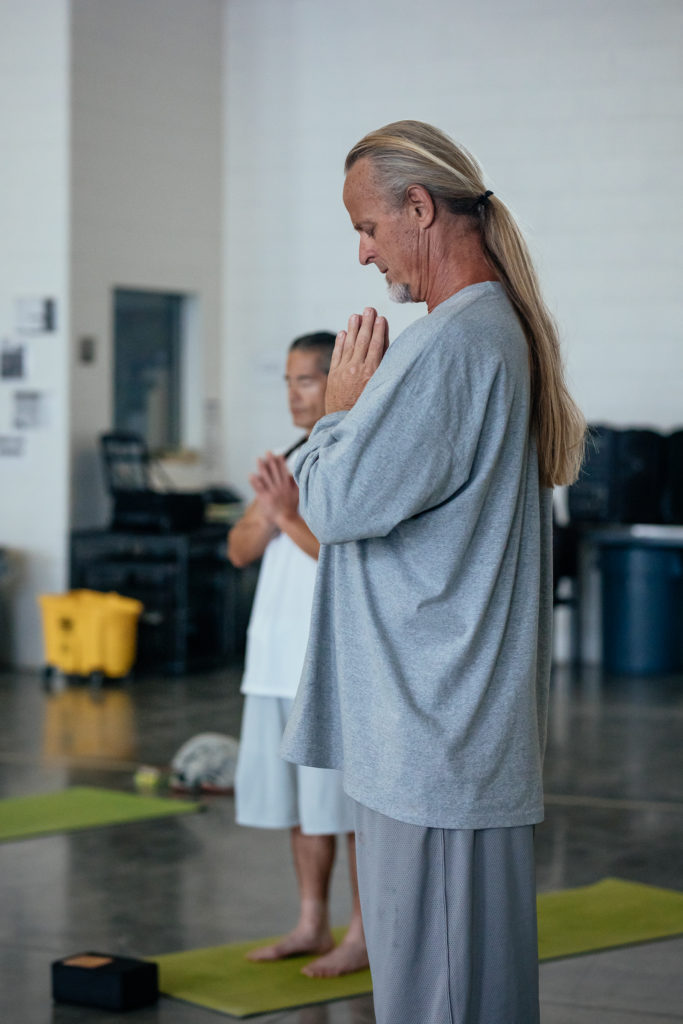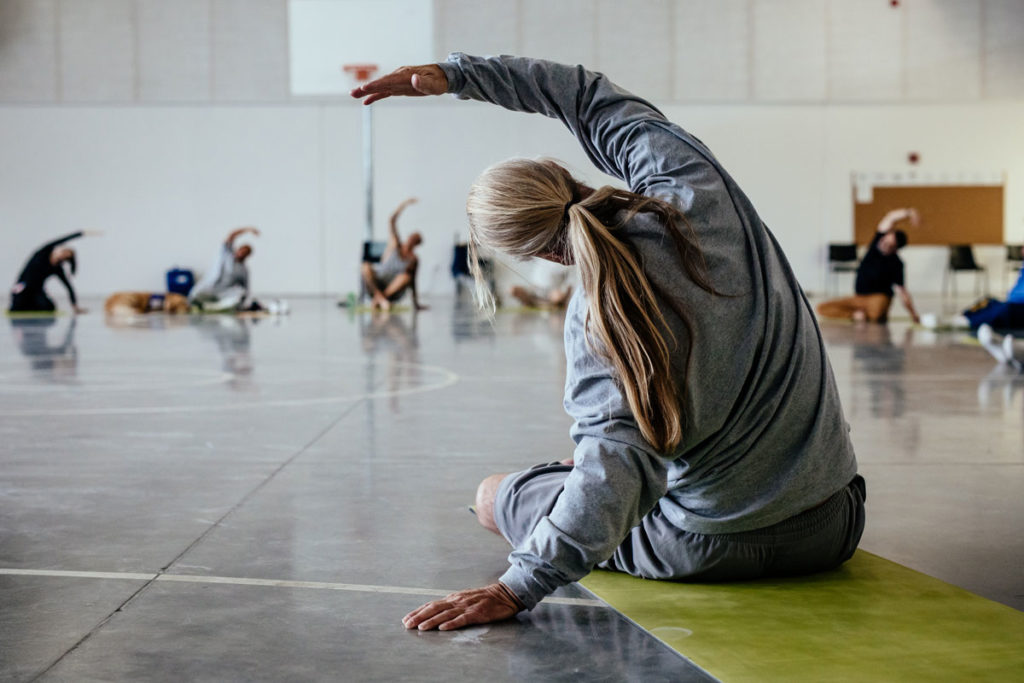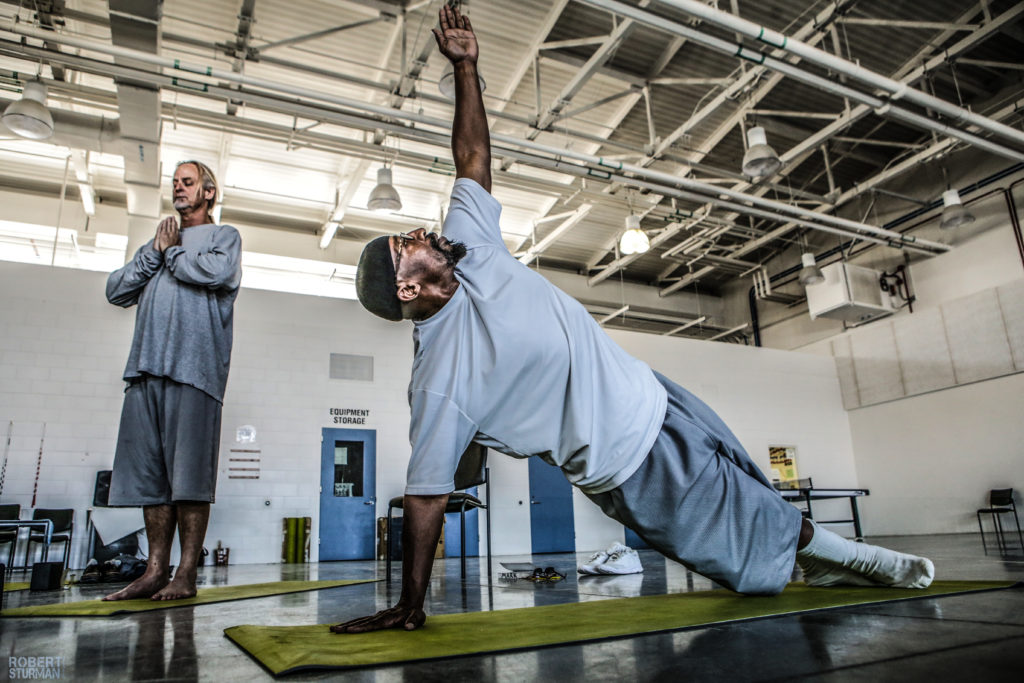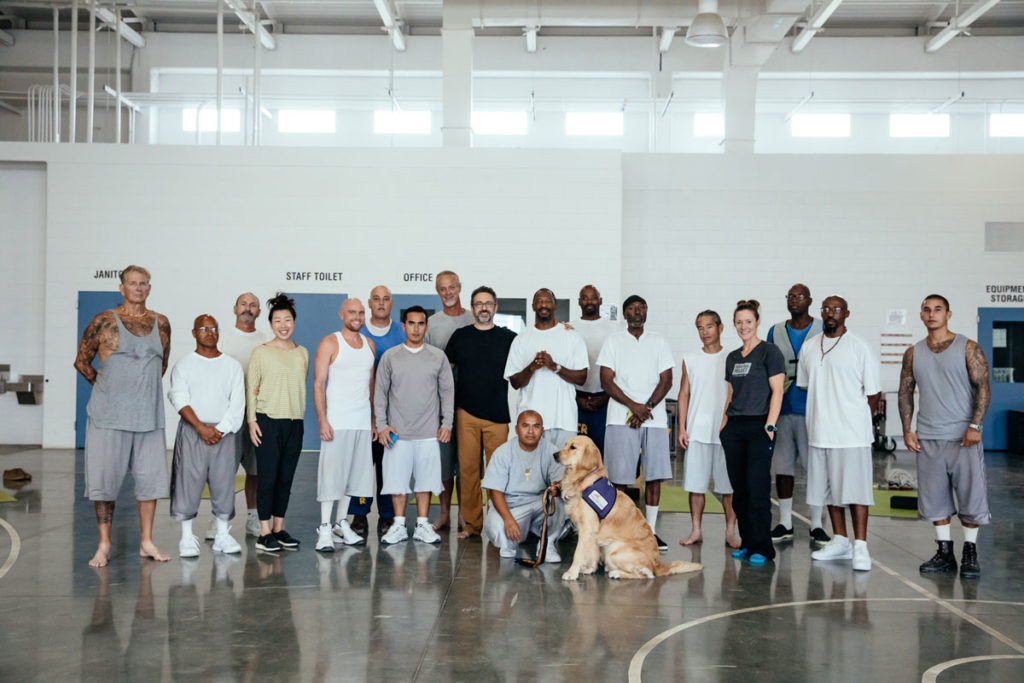“I’m actually thankful I didn’t get paroled at my last hearing because of how much better of a man this place and these programs have helped me become.” – Mark Phelps, Incarcerated since August 1987
What would make a man incarcerated for more than 30 years thankful that the parole board had denied his release? It sounds crazy, like some variation on Stockholm Syndrome. Or perhaps, after decades of confinement, Mark found something in prison that helped him release the suffering that led him to harm himself and others.

In the past two years, Mark has made a remarkable transformation. I’ve seen him change from an “excitable” man who was quick to anger to a joyful model of compassion and restraint. It’s a transformation that has taught me so much about what is possible through this work.
Before I continue, I want you to know that I’m writing because Prison Yoga Project needs your support. Demand for our services keeps growing – because our programs work. Mark’s transformation is just one example among the thousands of people we have seen changed through this practice.
We need your support to meet the demand for more programs, more in-depth training, and the research that makes clear the benefits our programs offer. Once again this year, generous donors have created a matching gift fund of $20,000 to give extra incentive to support our mission. Give now, and your donation will be doubled.
“Angrier and angrier”
“My problem was that if an incident happened, where I felt wronged in some way, I wasn’t able to let go of thinking about it, which would make me angrier and angrier.”
Does this sound familiar? It sure resonates with me. Or maybe your rumination led you to something other than anger. Self-medicating, sleepless nights, disordered eating, anxiety, self-harm, depression? My guess is, if you’re reading this, it was something. And, somewhere along the way, you found yoga, and that discovery has made all the difference. It did with me. And it did with Mark.
“A bunch of BS, hippie, yoga crap”
I met Mark at Richard J Donovan State Prison in San Diego, California, on June 19, 2017. We’d started our second yoga program at the prison a few months before. With space for 25 people, 68 signed up.
[Currently, the program has a one-year-long waitlist. We have programs on two ‘yards’ out of five at the prison. We have waiting lists on yards where we don’t yet have programs. Word spreads in prison. Hundreds of lives are waiting for a lifeline, for a chance at self-transformation. Your support could help immensely.]

I had been invited to speak at another non-yoga program in which Mark was participating. I offered the group a lesson I know well: how can we use embodied mindfulness as a tool for anger management?
It’s a simple lesson. Mark fed it back to me in the first feedback we received from him, just a month after he started practicing yoga with us. “He [ed. yours truly, hereinafter ‘the guy’] explained how those chemicals our brain releases into our bodies when we’re angry, dissipate in just 90 seconds, and explained if we just concentrate on our breath and what’s going on in our body that we’ve basically diverted our attention away from ‘retelling ourselves the story’ that was making our brain dump all those chemicals into our bloodstream.”
Mark is a quick study, but at first, he wasn’t buying it. The proof of the pudding, though, is in the eating. “I laughed inside, thought the guy was full of BS, but decided I’d try it the next time one of these ‘tough guys’ around here got under my skin, asking to get beat up and put in their place. It blew me away and actually worked! I didn’t get to talk smack to the guy for feeding me ‘a bunch of BS, hippie, yoga crap. … The breathing and concentration exercises work better than any anger management class I’ve ever taken. And I’m sleeping better now.”
That’s the feedback we got from Mark after he’d been practicing with us for about a month. Impressive, but still, it’s a long way from not beating people up and sleeping better at night, to being thankful for being denied parole.
“I grew up afraid all the time”
Like most incarcerated people, Mark suffered from childhood traumas. When I first met him, I’m not sure how aware he was of how these painful experiences had led him to the choices he made that landed him in prison. Today, Mark makes it clear that no matter what he went through growing up, there is no excusing the harm he caused. Looking back, the original pain he was trying to escape is clear enough.
“I grew up afraid all the time, of my dad, which kept me on ‘the edge’ throughout my life where the slightest thing could set off my fight or flight response.” His father was a hardened, Vietnam-era Marine combat veteran who made it clear, in Mark’s mind at least, that he was unwanted. His aggressive demeanor and discipline terrified Mark.
Mark is also the middle child, and his older brother and younger sister were, again, in his mind, the clear favorites. And Mark adored them too.
Mark recalls one incident as being pivotal. When they were kids, Mark and his brother were sledding using an old metal-runner sled. There was an accident. His brother was seriously injured. “I remember there was blood everywhere. He was like hamburger.” Mark ran to a neighbors house for help, and when they answered the door, he was so terrified he could not speak. He burst into tears and ran sobbing back to his brother.
His brother recovered but Mark was changed. Despite being younger, Mark became his brother’s protector. “He just wouldn’t fight, so when he was getting picked on, I did the fighting for him.” It was a strategy, Mark says, to win his father’s attention and approval. “I had to take care of him so that Dad would love me.” So Mark became a fighter to protect his brother. Which led to even more conflict, like the time a group of older boys beat him up, tied him to a trampoline, and pushed him over a fire to be roasted alive.

The trouble Mark got into led to a psychological evaluation that left him confused and with a profound sense of shame. “They strapped me into a chair and taped a bunch of wires to my head. I had to sit still and watch a light as it moved back and forth in front of me. I never found out what the test was all about, but it left me thinking there must be something really wrong with me.”
Mark found an escape from the feelings of being unwanted and the hostile world he inhabited through drugs, eventually working his way up to meth. He introduced his beloved little sister to drugs. Later, when she died after she drove her car off the road and into a telephone pole, Mark blamed himself. (An autopsy showed that she was not intoxicated at the time, but Mark didn’t see that until decades later.) After her death, Mark snapped. “I hated myself. I didn’t deserve to live. It just added to the rage inside of me.”
His downward spiral culminated in a shootout with police when he believed he was about to be busted during a traffic stop — busted for running a meth lab. Fortunately, Mark’s bullet only wounded the police officer he shot. After a days-long chase, Mark finally surrendered.
Mark’s behavior had roots in fear of his father that he grew up with, in the bullying he suffered, and, certainly, in the mentally debilitating drugs he used. His sister’s tragic death sent him into a spiral. And while there’s no excusing the harm he caused, we can start to see the origins of his harmful behavior.
“I realize people act out because they’re wounded.”
What I find so frustrating about Mark’s story is that he spent 29 years in prison, making himself and those around him miserable — decades waiting for someone to show him a way to safely release the anger that prevented him from unraveling his history to get to the wounds underneath. Decades waiting to be connected to a path of healing and community to heal within.
“I see people differently now. Like myself, I realize people act out because they’re wounded. Hurt people hurt people. And when you know that…it makes it easy to see someone acting out towards you with compassion (wondering how they were hurt) rather than become offended and angry.”
Still, we reach a small portion of the more than 2.2 million people incarcerated in the United States. But each year, with your help, we reach more and more. We provide evidence that unlocks change within the system and creates a higher demand for our services. And we sharpen our methodology to provide the best support we can for the most significant social benefit this work offers.
Mark wrote this after practicing yoga with us for a little more than a year and a half. This Mark is the man who is thankful he didn’t get paroled at this last hearing. And I’m thankful, too, because if the board had approved his parole without his having had the opportunity to transform himself, we would have failed him, his victims, and our society.
Your support makes this possible.
The system is changing. Incarcerated people have more and more opportunities for transformation and growth — programs like Prison Yoga Project’s work. Mark’s transformation is just one example of that.

We could not do all this without your financial support. It’s funding we count on directly, and it sends a message to the system that you believe making yoga and mindfulness available to incarcerated people can help them transform themselves and contributes to a safer, more peaceful world.
Please contribute today. Again, all donations before December 31, up to $20,000, will be matched, doubling your impact.
Thank you!

Bill Brown
Executive Director
Prison Yoga Project
PS – We’ve posted the second installment in this series, “I’d like to do something for these old guys we have in here.” Please enjoy.
Send a message to the system that you believe making yoga and mindfulness available to incarcerated people can help them transform themselves and contributes to a safer, more peaceful world.